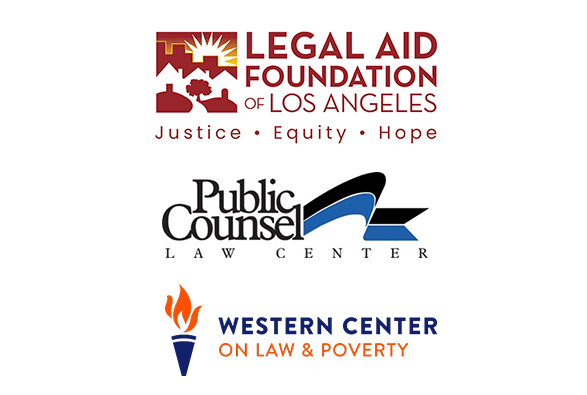In January, a Superior Court judge ordered the state to develop denial notices that satisfy constitutional due process protections for applicants.
OAKLAND, CA – March 2, 2023 – Attorneys representing three community groups suing the State of California for wrongfully denying applicants without adequate process in its Covid-19 rent relief program released a statement today denouncing the State’s decision to appeal a recent ruling in the case. In January, a Superior Court judge said that in rejecting an application for rent relief, the state must “specify the facts supporting the denial” in order to satisfy the applicant’s right to due process–meaning the denial notice must provide enough information for applicants to understand why the state rejected their application, and potentially appeal the decision. The state has been barred from issuing denial notices to the approximately 140,0000 remaining applicants until this requirement is met.
The state’s lawyer argued that this requirement would be too burdensome, and that in order to provide such information to applicants, the state would have to pay all remaining rent relief funds to the private contractor it hired to administer the program. Alameda Superior Court Judge Frank Roesch rejected the state’s argument and its implications that “a constitutional principle can be ignored because of budgetary reasons.” Last Friday, the state turned again to the Court of Appeal, requesting it throw out the lower court’s order.
In response, the legal team representing the community groups that filed the suit has issued the following statement:
“Our clients are simply asking the State of California to disburse rental assistance funds to eligible tenants so that they can avoid eviction, and for those that are found ineligible for assistance, provide a notice that explains why the tenant is being denied so they have a fair chance to appeal. Both the trial court and the Court of Appeal have agreed that tenants need to be told the specific reason they are being denied assistance.Yet, rather than provide applicants with the basic information both courts have said is required—information we know the program keeps track of—the state continues to dispute its obligation to the public, and has filed yet another writ in the Court of Appeal to end the injunction and continue issuing unacceptably opaque denials. At the same time, the state refuses to inform tenants who are still waiting for help nearly a year after the program closed why their applications are not being approved. We are disappointed by the state’s decision to put its resources towards litigation instead of distributing funds to eligible tenants and landlords. The state’s refusal to provide transparency is preventing much-needed relief from getting into the hands of tens of thousands of Californians. Many of these tenants have started to get eviction notices for nonpayment of rent, and the state’s inaction will harm Californians who need help now.
“If the state moves forward with denying the 140,000 remaining applications as it proposes, the program’s total denial rate could be approximately 44%, a shameful track record for the state with the highest need in the country. This denial rate does not include tens of thousands of additional applicants for whom the state only approved part of the rental assistance requested without explanation, leaving tenants vulnerable to eviction for the balance.
“We are concerned that the state erroneously continues to label the program as ‘in limbo.’ The only part of the program impacted by this lawsuit is the state’s ability to issue denial notices. Nothing is stopping the state from reaching out to applicants to help them fix mistakes on their applications, ask for missing information, or even disperse funds to approved applicants. Frustratingly, we hear from dozens of applicants every week who have been waiting patiently for a year or more with no follow-up, information, or assistance from the state.
“Rather than fix the numerous widespread issues with the program, the state continues to drag this case out and delay rental payments by refusing to amend their flawed notice, repeatedly running to the Court of Appeal, and engaging in legal delay tactics. They are now alarmingly turning around and blaming our clients —tenant rights organizations who have assisted thousands of tenants navigate the difficult application process—for the lack of payments to suffering Californians. But our clients have only ever had one goal in bringing this case: to make sure that our most vulnerable residents get the rent relief promised and avoid eviction. We hope the state begins to act with the same goals in mind.”
The state was sued last June by community groups Alliance of Californians for Community Empowerment (ACCE Action), Strategic Actions for a Just Economy (SAJE), and PolicyLink for issuing flawed notices that provided little or no explanation for why an applicant was denied, making it difficult for wrongfully denied tenants to appeal. The groups are represented by Legal Aid Foundation of Los Angeles (LAFLA), Public Counsel, Western Center on Law & Poverty, and Covington & Burling LLP.
Legal Aid Foundation of Los Angeles (LAFLA) is a nonprofit law firm that seeks to achieve equal justice for people living in poverty across Greater Los Angeles. LAFLA changes lives through direct representation, systems change, and community empowerment. It has five offices in Los Angeles County, along with four Self-Help Legal Access Centers at area courthouses, and three domestic violence clinics to aid survivors.
Public Counsel is the nation’s largest provider of pro bono legal services, utilizing an innovative legal model to promote justice, hope, and opportunity in lower-income and communities of color in Los Angeles and across the nation. Through groundbreaking civil rights litigation, community building, advocacy, and policy change, as well as wide-ranging direct legal services that annually help thousands of people experiencing poverty, Public Counsel has fought to secure equal access to justice for more than 50 years.
Western Center on Law & Poverty fights in courts, cities, counties, and in the Capitol to secure housing, health care, and a strong safety net for Californians with low incomes, through the lens of economic and racial justice.



